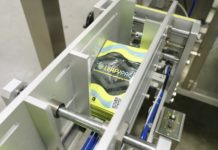TurboFil Packaging Machines LLC, an equipment specialist dedicated solely to the design and development of liquid filling and assembly machines, has introduced a fully automatic machine utilizing its popular TipFil™ syringe filling process. Designed with monoblock modularity for as-needed manufacturing, the company’s new TipFil™ Syringe Filling & Assembly Machine completely automates all processes – from syringe loading, filling and capping through inspection, labeling and printing.
Incorporating a racetrack indexing system for rapid, reliable throughput of up to 50 pieces per minute, the servo-driven intermittent motion machine features interchangeable pucks to accommodate various syringe sizes from 1-60mls. Loading is performed via elevator hopper to a vibratory bowl, which transfers syringes to a tracked placement mechanism. Plungers are inserted with an automatic tamping station equipped with position sensors.
Dosing is performed via ceramic pump, with a no container/no fill sensor preventing product wastage. Metering occurs via plunger positioning sensors, with a plunger pullback mechanism reducing drips and assuring exacting fill levels. From there, three stainless steel shutoff nozzles execute through-the-tip filling, and press-on or turn cap placement is performed using a pick-and-place system incorporating a linear track and stainless steel vibratory bowl feeder. The system can handle a wide range of product viscosities.
Once any rejects for missing components or fill volume are automatically removed from the production line, filled syringes proceed to the integrated labeler. Labeling function is facilitated by a roller conveyor that transports the syringes to the labeling head. A printer adds lot number and expiration date along with any additional necessary markings, including QR codes for additional information or instructions.
Ergonomically designed for single-person operation, TurboFil’s TipFil™ Syringe Filling & Assembly Machine features a 10” touchscreen HMI, Allen Bradley PLC, and three password levels for access protection. Ethernet capabilities allow for remote diagnostics, while easily identifiable buttons for emergency stop, reset, and circuit breaker-enabled on/off provide expedient line stoppage and intervention.

























